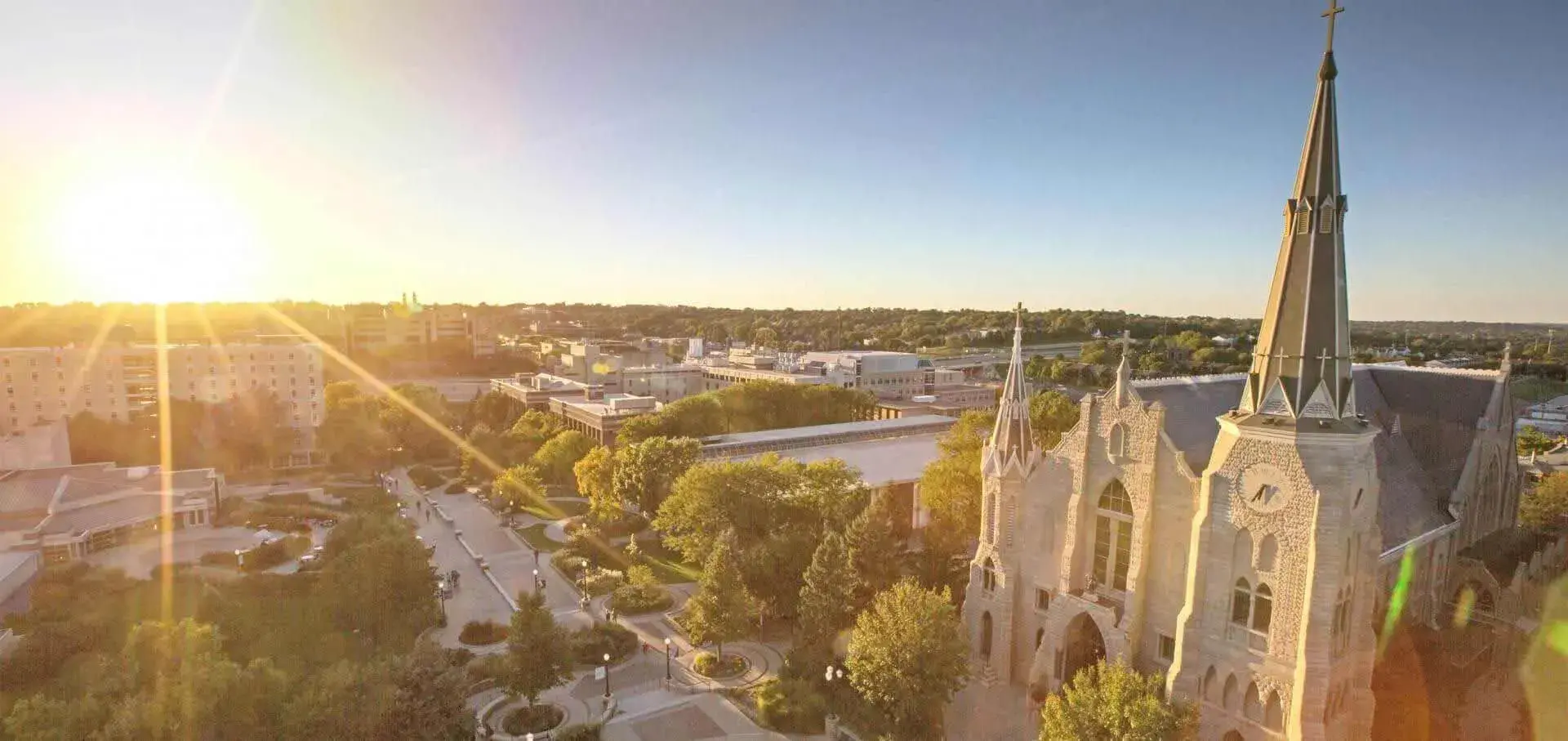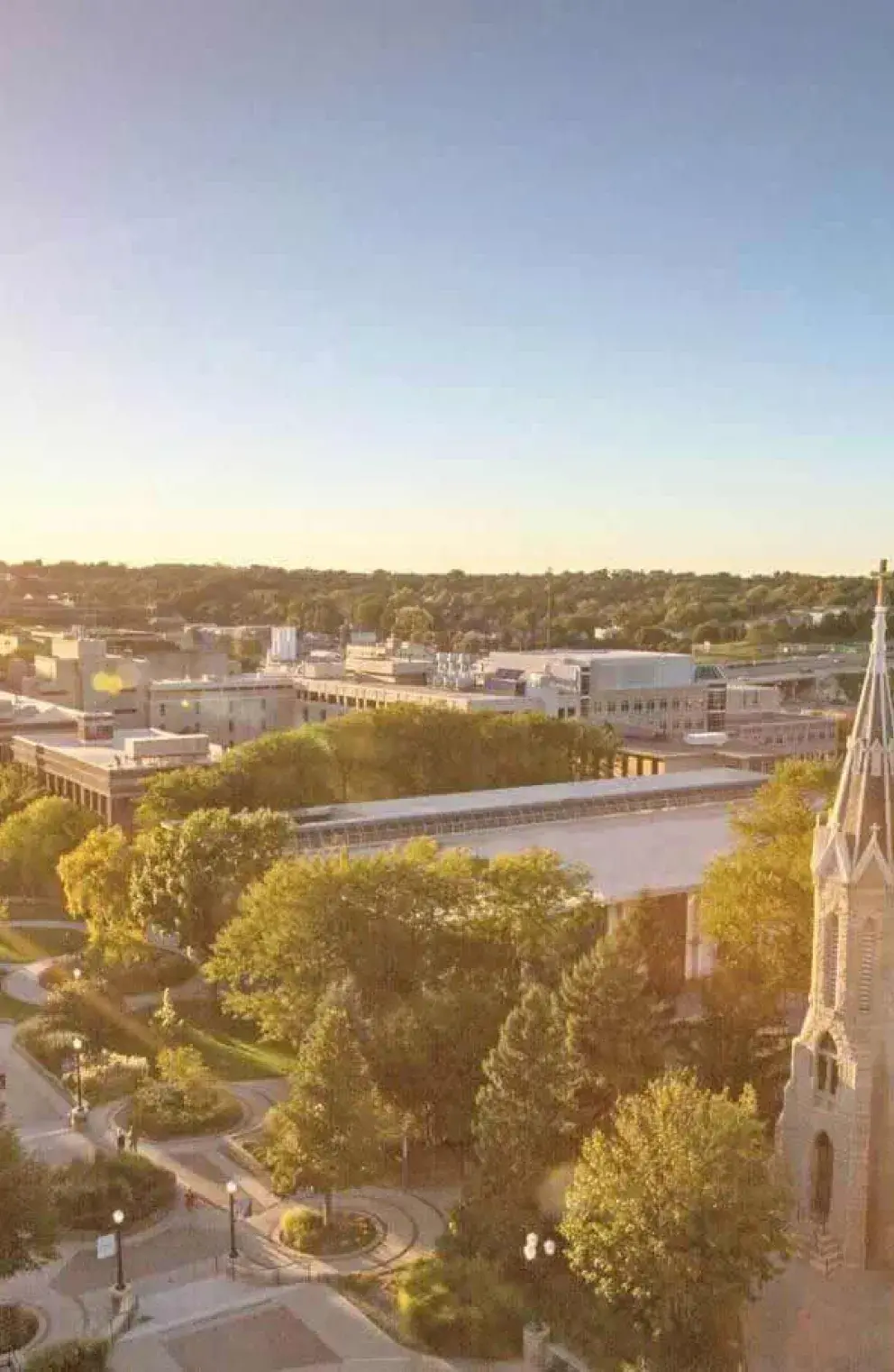
What is a Jesuit Education?
A Transformative Path to Making an Impact
Jesuit education has been shaping minds and hearts for nearly 500 years. Rooted in the tradition of St. Ignatius of Loyola and his early companions, Jesuit schools seek to form individuals who are intellectually competent, morally grounded and committed to serving others. But what makes a Jesuit education different?
A Jesuit education challenges students of every background and faith to think deeply about who they want to be, as well as the contributions they can make in the world. When you’re at Creighton, your capacity to reflect, grow and act will be nurtured and supported.
You’ll have opportunities to use your talents to address society’s greatest needs while serving with and for others. You’ll mature as an ethical thinker, writer and speaker—key skills that employers look for and that society urgently needs. And you’ll graduate equipped to make a difference, with the courage to ask tough questions and a clear sense of what it means to live a life of consequence.
The Jesuit, Catholic Values That Set Us Apart
Finding God in All Things
St. Ignatius of Loyola taught that everything that exists comes from a loving God who can be discovered in the world and in each person. Living with a commitment to “finding God in all things” means noticing and experiencing God’s active love in other people, in the world around us and in everyday moments (not only in explicitly religious settings). Each time we find God in this way, we have the chance to deepen our knowledge of, relationship with and responsiveness to God.
Cura Personalis
Cura personalis means “care for the whole person” or, more accurately, “care that is personal” in Latin. It’s about recognizing that every person is a unique gift from God, with their own talents, strengths and needs. Each of us is made in God’s image and inherently worthy of dignity. We are all meant to live fully, freely and authentically. At Creighton, this means we take time to understand, respect and support each individual as a whole person. We focus on your growth in every area, including intellectual, physical, artistic, social, psychological, moral and spiritual well-being.
Reflection and Discernment
In our busy lives, it’s easy to get caught up in constant activity and distractions. The value of reflection and discernment invites us to slow down, pay attention and look inward. By making time each day to reflect, through practices like the Ignatian Examen, we strengthen our ability to “find God in all things” and to notice God’s presence in our lives and hearts. As we grow in this awareness, we become better able to recognize and follow God’s unique invitations for each of us.
Magis “More”
Magis, meaning "more," challenges us to seek what leads to the greatest good; the choices, actions and commitments that help us grow more fully and contribute to something bigger than ourselves. The Latin phrase Ad Majorem Dei Gloriam, meaning “For the Greater Glory of God,” is the motto of the Society of Jesus and captures the spirit of magis. It reminds us to live with purpose and aim for what matters most.
For and With Others
Our Jesuit tradition calls us to look beyond ourselves and live as people who are “for and with others,” building genuine relationships with individuals and communities who are poor or marginalized. These connections help us understand our shared humanity and develop a sense of solidarity that inspires us to use our talents, time and energy to work toward a world that better reflects God’s vision for all people and the earth we share.
Faith that Does Justice
In the Jesuit, Catholic tradition, faith is not only what we believe but also how we live. “Faith that does justice” means putting love into action. It means working alongside God and with others to seek the common good and help create a more just world.
Frequently Asked Questions
No. Jesuit colleges and universities, including Creighton, welcome students of all faiths and those with no religious affiliation. While rooted in the Catholic tradition, Jesuit education also emphasizes open dialogue and mutual respect.
In fact, respect for others is foundational to Jesuit values. Jesuit education doesn’t just allow for religious diversity; it sees engagement with other beliefs as essential to forming ethical, compassionate and globally aware individuals.
You’ll find a diverse student body and plenty of opportunities to explore your own beliefs and values, whatever they may be.
Creighton students tend to be curious, motivated and open to growth, both personally and ethically. You’ll find classmates who care about making a difference in others' lives and in the world. Creighton students want to be challenged and value community. Whether you’re interested in science, the arts, business or helping others, there’s room for you here.
Jesuit values will show up in how and what you learn. You’ll be encouraged to think critically, reflect deeply and consider the human impact of your work, no matter what you study. Many classes include real-world experiences like service learning or community-based projects. The goal isn’t just to prepare you for a job; it’s to help you become a competent, compassionate, conscientious and courageous leader in whatever field you choose.
St. Ignatius of Loyola was born in 1491 in the Basque country of northern Spain. He was devoted to chivalry and suffered a severe leg wound in battle. During an extended recovery period, he experienced the start of a profound conversion and devoted the rest of his life to serving God.
St. Ignatius left a great legacy. He founded the Society of Jesus, the “Jesuits,” in 1540 together with six companions, and he became their first Superior General. Under his leadership, Jesuits started schools so they could form the next generation’s thoughtful and ethical leaders. St. Ignatius also wrote the Spiritual Exercises, a renowned set of Christian meditations and contemplations designed to aid discernment and deepen one’s relationship with God.
The Jesuits, formally known as the Society of Jesus, are a Roman Catholic religious order founded in 1540 by Saint Ignatius of Loyola and a small group of companions. Their mission is to serve the Church and the world through education, intellectual pursuit, spiritual formation, and social justice.
Jesuits are especially known for founding and operating schools, colleges and universities around the globe, focusing on rigorous academics, ethical leadership and the development of the whole person (mind, body, and spirit). They are also active in pastoral work, missionary efforts, interfaith dialogue and advocating for peace and justice.
Guided by Ignatian spirituality, Jesuits emphasize discernment, reflection and finding God in all things.
Association of Jesuit Colleges and Universities
Creighton University is one of 28 Jesuit colleges and universities that comprise the Association of Jesuit Colleges and Universities (AJCU)—with 27 institutions within the United States and one in Belize. These institutions range from major research universities to comprehensive universities; from smaller colleges and universities that combine the liberal arts and professional studies to one strictly liberal arts college.
International Association of Jesuit Universities
Creighton University is a member of the International Association of Jesuit Universities (IAJU), a global network of Jesuit institutions committed to academic excellence, collaboration, and the Jesuit mission of justice and service. Through this affiliation, Creighton connects with a network of 177 Jesuit colleges and universities across five continents.




